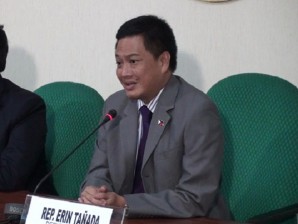‘Victim-centric’ approach will boost human rights laws–Tañada
MANILA, Philippines – A lawmaker on Tuesday highlighted the importance of comprehensive measures to provide assistance to victims of human rights violations, saying this type of “victim-centric” approach could serve as a “benchmark” for determining successful enforcement of human rights laws.
“Success (in human rights enforcement) is determined in large measure by the institutional capability of the state to provide the full range of reliefs to a victim,” Deputy House Speaker Lorenzo “Erin” Tañada III said in a forum on human rights held in Makati.
Tañada joined representatives of the National Council of Churches in the Philippines (NCCP) and the Delegation of the European Union (EU) to the Philippines in the forum that carried the central theme “Protecting Victims of Human Rights Violations.” The event took place a few days ahead of the International Human Rights day on December 10.
In his speech, Tañada noted that though the country has taken significant improvements in terms of enacting “critical statutes” on human rights, more needs to be done since “no successful prosecutions could be attributed to the new laws.”
“None of us, I think, is satisfied as to the obvious disparity between the ease with which we agree to human rights principles, and the difficulty of applying those principles successfully in actual cases,” Tañada said.
Article continues after this advertisement“The Philippine human rights situation, it has often been said, is good on paper, not so much in real life. This, I am afraid, continues to be the situation now,” Tañada said.
Article continues after this advertisementTañada said that the type of victim-centric perspective could help the country form an outline of the minimum capabilities it needs to develop to effectively enforce human rights laws: protection from human rights violation; restorative measures; and access to justice.
He argued that the country should consider giving human rights courses to the police and members of the public prosecutor’s office, saying education, training and, institutional reform were needed to fully integrate human rights principles into the performance of official functions.
He added that the country needed to boost its witness protection program, and ensure the safety of the human rights witnesses in exchange for participation in the prosecution process.
“Otherwise, the prosecution effort is easily jeopardized. High profile cases like the Maguindanao Massacre Trial-where the witnesses are dropping like flies-illustrate our case for us,” he said.
Ambassador Guy Ledoux, head of the EU delegation to the Philippines, for his part, said that the issue of extra-judicial killings in the country “remains a serious concern,” and called for an end to impunity through conviction of those behind extra-judicial killings and enforced disappearances.
Ledoux said that the EU delegation would continue to partner with non-government organizations in the Philippines, especially in protecting and sheltering victims of human rights violations and their families, as he announced that more than P47 million had been provided by the delegation to support human rights projects of four civil society organizations.
The four grantees under the European Instrument for Democracy and Hunan Rights are: the Karl Kubel Stiftung fuer Kind und Familie, Handicap International, the National Union of People’s Lawyers, and the Union of People’s Lawyers in Mindanao.
“We hope that through these projects would further increase the consultations and cooperation on human rights relates issues between the Philippines and the European Union,” Ledoux said.
